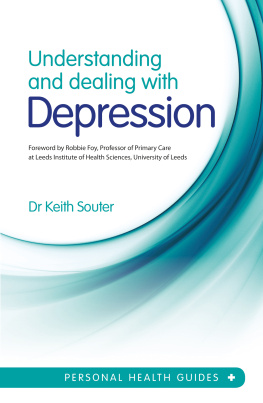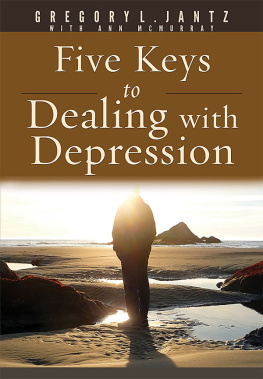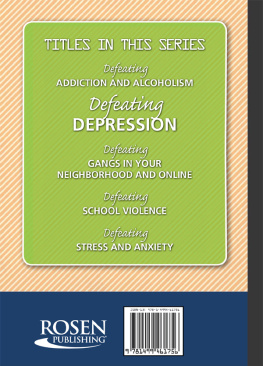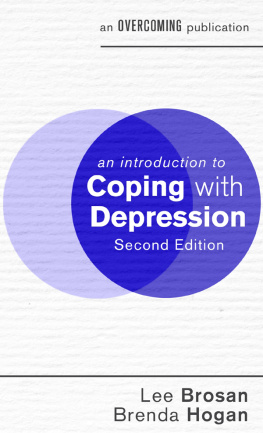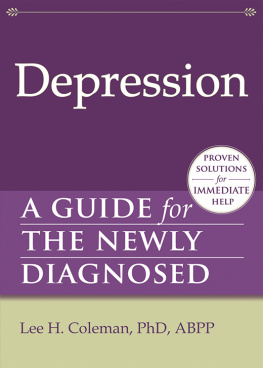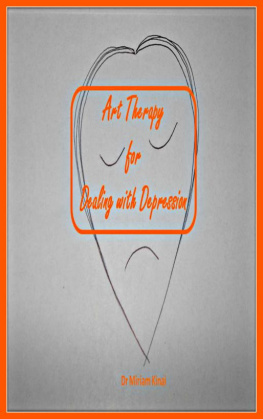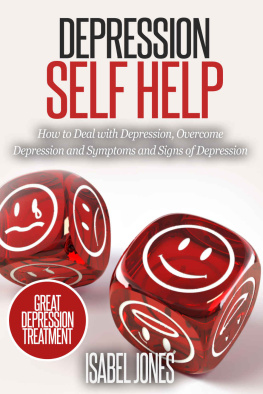
Understanding
and dealing with
Depression
Foreword by Robbie Foy, Professor of Primary Care
at Leeds Institute of Health Sciences, University of Leeds
Dr Keith Souter

UNDERSTANDING AND DEALING WITH DEPRESSION
Copyright Keith Souter, 2013
All rights reserved.
No part of this book may be reproduced by any means, nor transmitted, nor translated into a machine language, without the written permission of the publishers.
Keith Souter has asserted his right to be identified as the author of this work in accordance with sections 77 and 78 of the Copyright, Designs and Patents Act 1988.
Condition of Sale
This book is sold subject to the condition that it shall not, by way of trade or otherwise, be lent, re-sold, hired out or otherwise circulated in any form of binding or cover other than that in which it is published and without a similar condition including this condition being imposed on the subsequent purchaser.
Summersdale Publishers Ltd
46 West Street
Chichester
West Sussex
PO19 1RP
UK
www.summersdale.com
Printed and bound by CPI Group (UK) Ltd, Croydon, CR0 4YY
eISBN: 978-0-85765-941-5
Substantial discounts on bulk quantities of Summersdale books are available to corporations, professional associations and other organisations. For details contact Nicky Douglas by telephone: +44 (0) 1243 756902, fax: +44 (0) 1243 786300 or email: .
This book is dedicated to anyone who has ever experienced the oppressive burden of depression.
I would like to thank Isabel Atherton, my wonderful agent at Creative Authors, for helping to bring this book to light.
Thanks also to Claire Plimmer who commissioned the title and to Debbie Chapman, my project editor, whose suggestions have made this a better book than it otherwise would have been.
Thanks also to Rachael Wilkie, my copy-editor, who knocked some of the final rough edges off the manuscript.
It has been a pleasure to work with them all.
Finally, a big thank you to Professor Robbie Foy for taking the time out from his busy schedule to read the manuscript and write the foreword to this book.
Contents
By Robbie Foy
Professor of Primary Care at Leeds Institute of Health Sciences, University of Leeds
For most of us, our lives have been affected by depression, be it through our own personal experience or contact with others. Some of us may have been affected without having realised it. About four out of five people with depression experience it more than once, and up to one in five experience it over many years. This common condition causes individual and family distress, dysfunction, and disability. It complicates other medical problems and causes many lost days of work.
So, what should we talk about when we talk about depression? Conversations with affected people and health professionals often cover three issues: recognising depression, seeking help, and coping and control.
Surprisingly for a condition with so many consequences, depression can be hard to recognise by sufferers, friends and family, and health professionals. This is because it usually creeps up on people insidiously and changes how they feel, think and behave in a variety of ways. It may take some sort of personal crisis to make people realise that something is wrong. Its symptoms may not show in straightforward emotional ways; often people seek help for physical problems, such as sleep disturbance, chest pain or headaches. Detection can be especially difficult in those with long-term physical illnesses who are at greater risk of depression. This is partly because its symptoms overlap with those of physical illness, such as fatigue in heart disease. However, one of the greatest barriers to recognition is the fear of having depression itself people often worry that they will lose their jobs, lose their friends or lose their minds. People also see depression as something that happens to others and not to themselves. There is still a great deal of work to be done in challenging stigma and false beliefs about depression.
For those that seek professional help for depression, treatments available usually comprise antidepressant medication or talk therapy. As for many other aspects of healthcare, there are always new research findings to guide treatment decisions; these sometimes cause confusion. For example, family doctors in Britain used to be criticised for not prescribing antidepressants often enough and in high enough doses. It is now evident from research that antidepressants have limited effects on symptoms for people with less severe depression. Therefore, we are now seeing a continuing climb in antidepressant prescribing, which partly stems from professional habits and patient demand. The growing availability of talk therapies will hopefully provide people with depression with a greater choice of types of professional help. These treatment options do not undervalue the mainstay of treatment in British general practice: watchful waiting combined with empathetic listening and support whilst people find their own paths to recovery.
People affected by depression also need to find their own ways to cope with symptoms and take back some control over their lives. This can be daunting, especially given that helplessness and loss of motivation typically go hand-in-hand with depression. Yet there is a wide range of practical measures. For example, what we do affects how we feel. It is worth identifying activities that someone with depression previously enjoyed but has missed since becoming depressed, and gradually taking them up again in small but steady steps. Everyday activities such as walking the dog or cooking can form part of a personal recovery or coping plan.
Dr Souter addresses such issues in this book, directly and with clarity. I hope that people will find it helpful in navigating through the often perplexing experience of depression safely and successfully.
Most people will feel down in the dumps at some stage in their life. That is normal, and it is part and parcel of being human. Usually you can pinpoint the reason and relate it to some event in your life, or perhaps to something that has happened to a friend or relative. It may be to do with something that has happened at work, or even something that you have read about or seen on the television, which has stirred up a feeling of empathy. Such episodes normally do not last long and you can often rationalise the emotion and perhaps talk yourself out of it, or share it with a friend, finding that the feeling soon goes. Or you can distract yourself from it by doing something that you enjoy doing, and find that you soon get back to normal.
People can describe their feelings as being blue, sad, browned off, and so on. When we describe them in those terms, there is generally an acceptance that it is normal to experience such flattening of the spirits from time to time, and a tacit understanding that the feeling will not last long.
When these feelings last longer than a week or two, persisting for weeks on end and even for months, then that is quite different. So too is it different if the feeling is so bad that it begins to interfere with your life. This is likely to be actual depression. It is an indication that you need to do something about it and probably seek or mobilise help.
Depression is far more common than people imagine. According to the Office of National Statistics, one in ten of the adult population will be experiencing depression at any one time. Major depression, which we shall talk a lot about in this book, is occurring in one in twenty people at any one time. It is important to recognise this in yourself if you are feeling extremely low. If you ever think about harming yourself or have suicidal thoughts then you should seek help as soon as possible.
Next page
